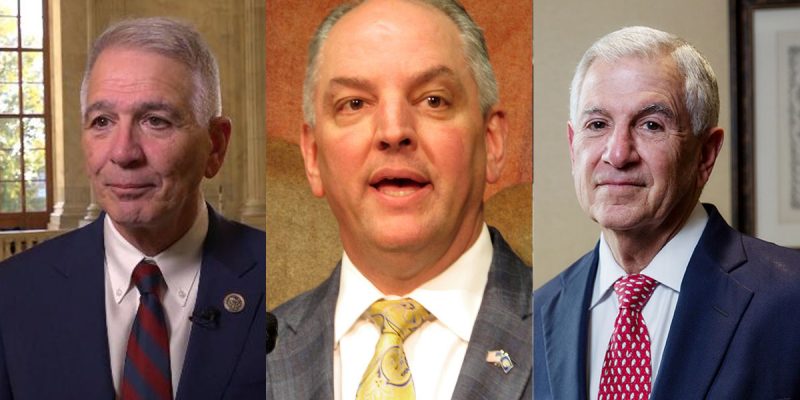Much has been written, even vented, over a private poll that asked questions including about the upcoming Louisiana governor’s race. In the final analysis, its controversial results points to likely errors both in execution and interpretation.
Done by longtime pollster Verne Kennedy, it represents the latest in a series stretching back years commissioned by a number of figures active in business and politics, including John George, owner of the Baton Rouge Advocate. In those pages appeared a summary of the results.
In one way, it confirms other polling. Democrat Gov. John Bel Edwards doesn’t win against Republican challengers Rep. Ralph Abraham and businessman Eddie Rispone, but he leads each with 46 percent. His lead exists in part because of their lower name recognitions but, Kennedy insists, he would go well over 50 percent if the proportion of black sample voted 90 percent for him.
This analysis draws multiple yellow cards. For one thing, no survey internal numbers were released so observers don’t know some important information by which to assess the credibility of Kennedy’s assertion. Specifically, there’s nothing about the turnout model – the proportion of Democrats, particularly black Democrats, in the sample – nor what proportion of blacks registered a preference.
He also appears to assume, with little justification, that enough blacks calling themselves undecided will vote for Edwards to get him to 90 percent of the entire black subsample in his column. In fact, at this point in a campaign a black not stating a preference equally will vote for a Democrat or not vote for a Democrat, either by voting for a non-Democrat or not at all.
Kennedy terms his poll one of “active” voters, which could discount not voting at all. But having “active” voters (left undefined, but probably someone who has voted in X number of recent elections) doesn’t inoculate from rolling off, because that doesn’t distinguish among national, state, and local contests. For example, one can seem like an active voter by very faithfully voting every two years in federal elections, but much with much less fidelity for state contests.
Typically, about 70 percent of blacks at this stage will say they intend to vote for a Democrat. So, if 15 percent of the remainder will show up to do that on election day, that’s only about a 4 to 5 point boost, not the 12 percent Kennedy alleges. The only way he can come up with such a bonus is by heavy oversampling of blacks; but again, we can’t know without a release of the poll’s internal numbers.
Making his interpretation even more questionable is it goes against the run of play. Apparently not long after these results (gathered in April, leading to the question why their release comes two months later) came in, a truly independent poll came out with numbers leading to a less optimistic interpretation for Edwards’ chances (where he can’t even reach 40 percent of the intended vote). Both can’t be right, but telling is that the other poll released all its internal numbers, which upon investigation appear to rely on reasonable assumptions in its turnout model.
And Edwards’ polling isn’t the only item with disagreement between the Kennedy poll and the other right afterwards. Kennedy’s claims Edwards had 52 percent job approval, while in the other Edwards couldn’t crack 40 percent on a question about whether he had been “good” for the state. Regarding GOP Pres. Donald Trump, Kennedy’s survey had his approval at 47 percent but the other pegged that at 54 percent.
Advertisement
Only two things could explain such divergent results among polling done so close together: a bad sample from one or substantially differing turnout models. From what little information Kennedy has released, it appears his turnout model paints a substantially more optimistic model for Edwards than the other poll (and, it would seem, the few others investigating the race).
Finally, the Kennedy poll itself internally contradicts. Another question asked about the direction of the state, which came in decidedly negatively with almost half of voters calling it headed in the wrong direction while only about a quarter said it moving in the right direction, for a net negative 19 points. Kennedy named this the most pessimistic reading ever.
History shows this result to be bad news for an incumbent governor. On this question, the Louisiana State University Public Policy Lab’s Louisiana Survey series registered in 2007 a net negative 15, when the incumbent Democrat Gov. Kathleen Blanco didn’t even run for reelection because of low popularity. In 2011 with the statistic about even, Republican former Gov. Bobby Jindal cruised to reelection. Comparatively, why should Edwards seem relatively popular when other data suggest he shouldn’t be?
All in all, at least how Kennedy describes it (and in what he doesn’t reveal), this poll appears as an outlier, especially to one conducted around the same time. Plus, why did The Advocate want to run a story on a poll so out-of-date it’s not just stale, it’s moldy?
Readers can draw their own conclusions. But to those with knowledge of and experience with public opinion polling, the Kennedy poll’s presentation contains too many questionable aspects to think it validly illustrates public opinion about the governor’s race at this point in time.
Advertisement
Advertisement

